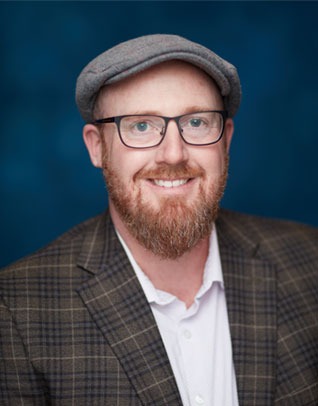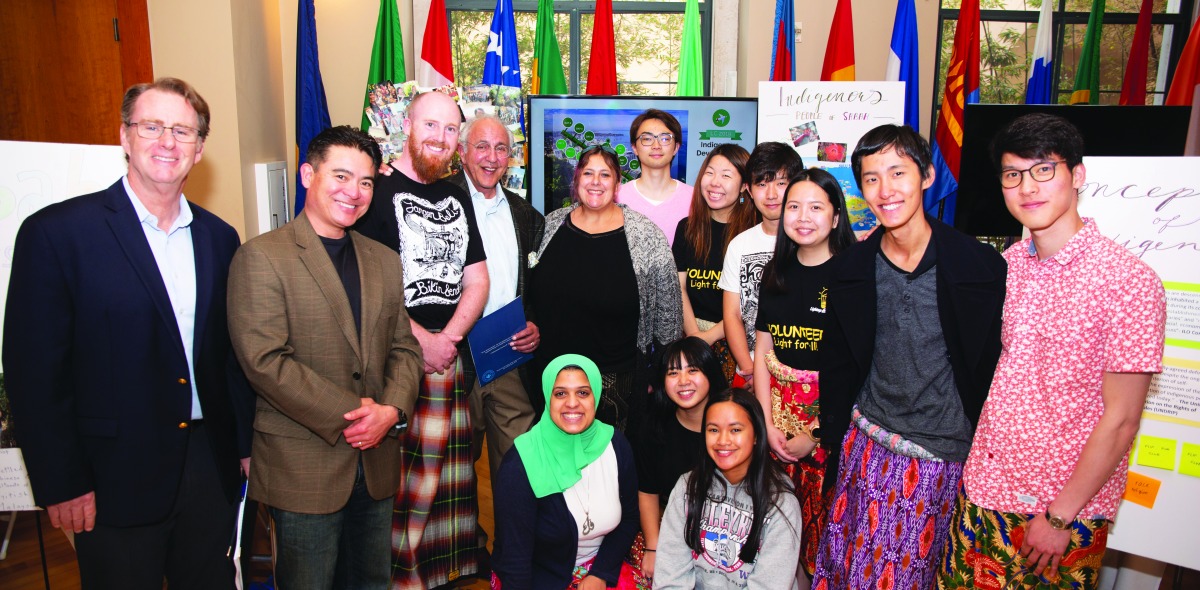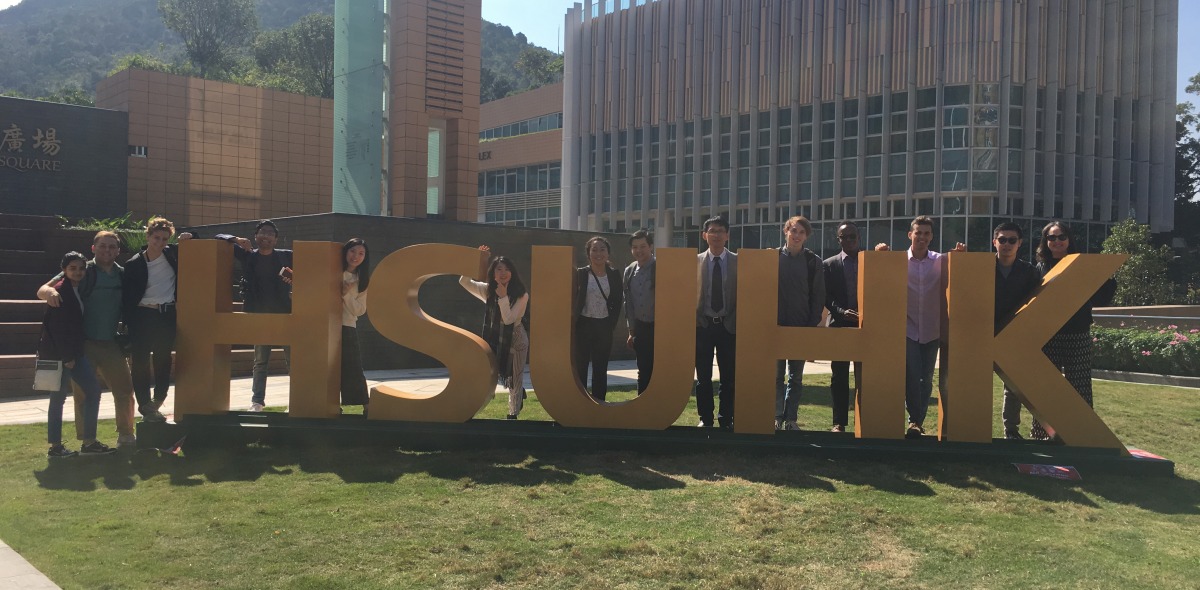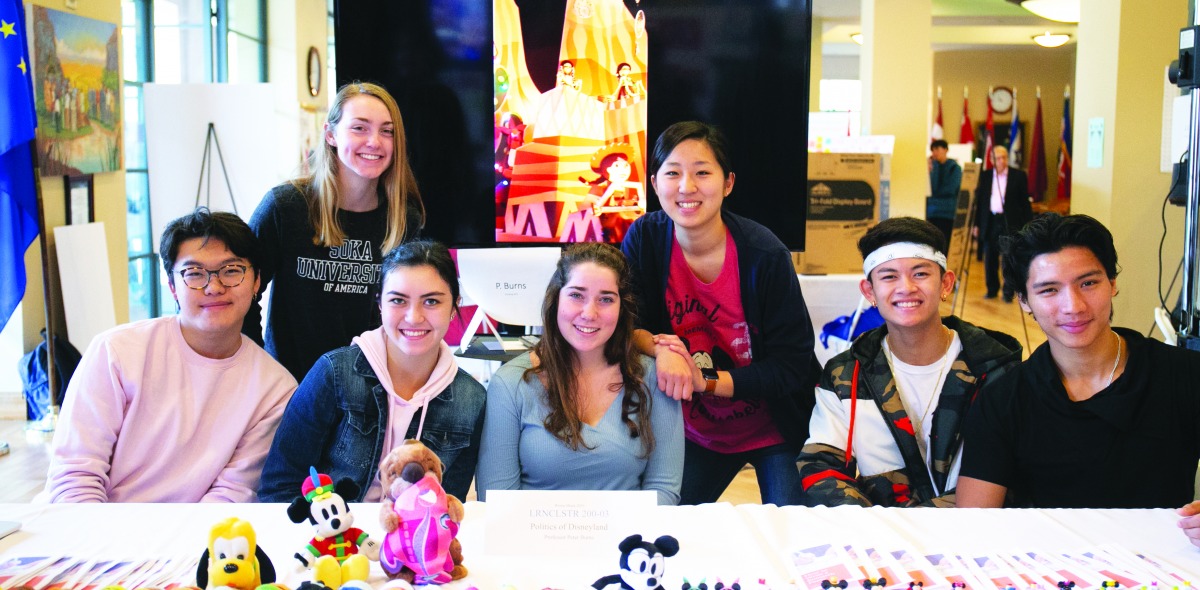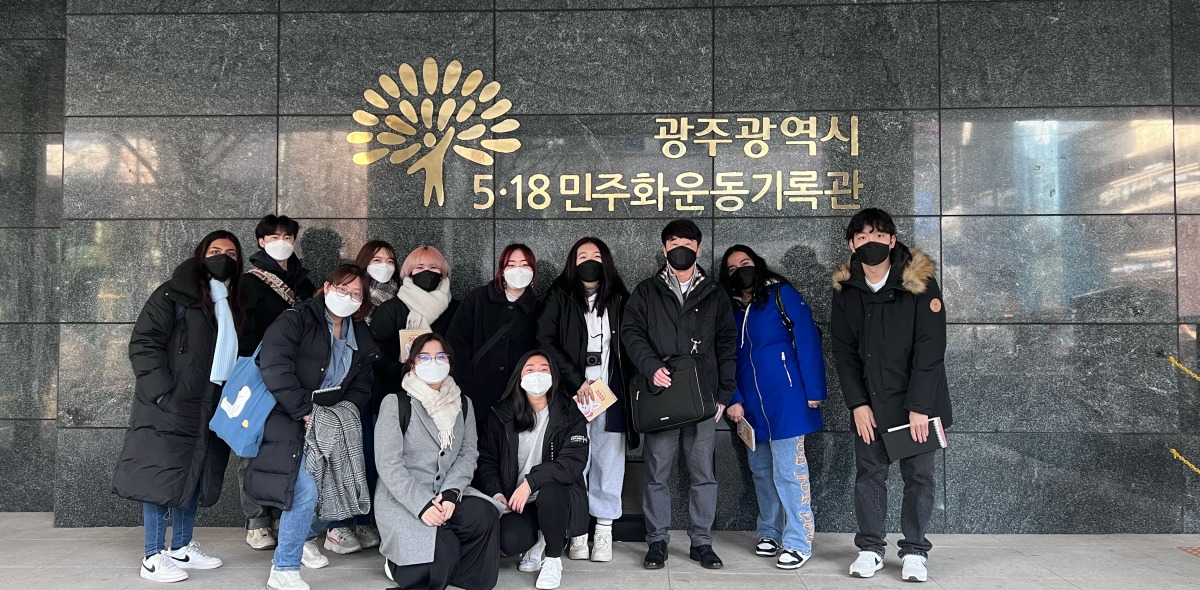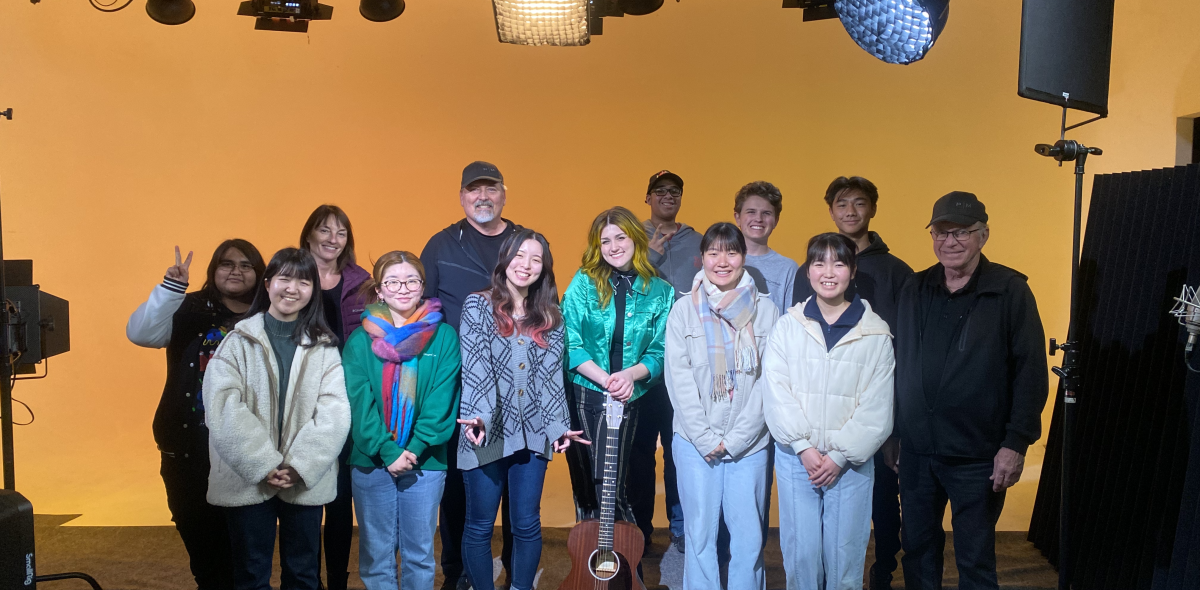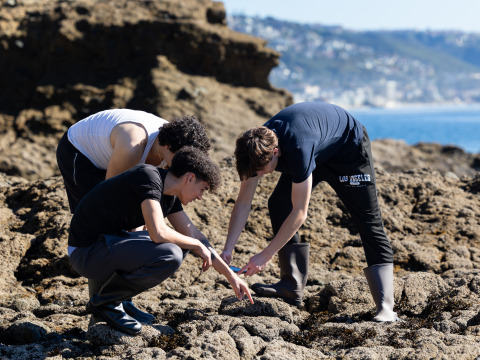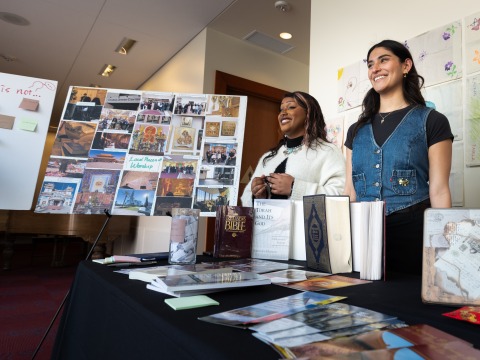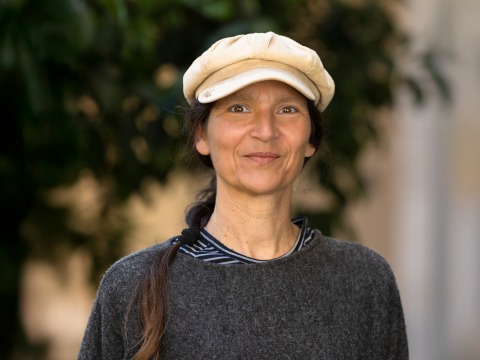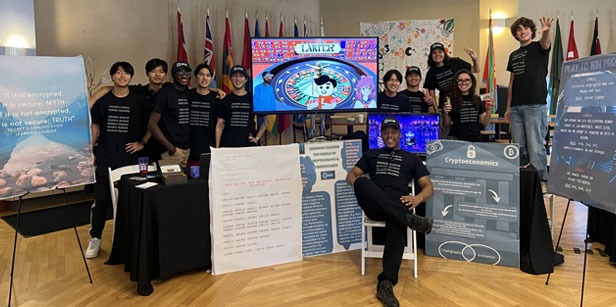
The Learning Cluster
Experiential Learning to Develop Global Citizenship
Learning Cluster courses are signature features of the SUA curriculum. Offered during the Winter Block, a 3.5-week period in early January, Learning Clusters are intensive 4-credit courses that seek to tackle pressing real-world issues. All SUA undergraduate students must complete a Learning Cluster in their first and second years, with some students completing an additional Learning Cluster in their third year. Under the guidance of a faculty member, the LC experience encourages classes of 12 or fewer students to immerse themselves in understanding a single topic or problem. LCs are closely related to our university’s mission, especially its emphasis on global citizenship, often moving beyond traditional classroom environments, with some able to travel regionally or globally with the support of competitive grants (at no additional expense to students). More than a geographic journey, the Learning Cluster is an opportunity to journey across cultures and to explore a wide swath of ideas, embodying the “imaginative empathy” characteristic of global citizenship. All told, SUA’s Learning Clusters are among the most popular, fulfilling parts of our students’ journeys.
You will learn to:
- Develop critical, analytical, and investigative skills to formulate educated responses to a specific problem or question
- Develop personal and leadership skills to work collaboratively toward the completion of a common project
- Develop skills and awareness as concerned and engaged global citizens
The term ‘Learning Cluster’ was coined by John D. Montgomery as SUA prepared to open its doors in the late 1990s. Specialized courses taking place between regular semesters have been staples of liberal arts education for over a century. At other leading liberal arts universities, these unique courses may be referred to as January-terms, J-Terms, interterms, and Winter Terms. The first Learning Clusters were offered in May 2002, and in the following year, were offered in May and August. In 2007, Learning Clusters shifted to the January block, and in 2009, the first travel grants were awarded. SUA offers approximately 25 LCs annually, with individual “Clusters” capped at 11-12 students. In SUA’s first 20 years (2002-2022), we have offered over 600 LCs. The topics have varied immensely, including United Nations Reform, issues in language translation, preserving California’s natural history, protecting freshwater fish species in Cambodia, combatting Child Labor, building a culture of peace, sustainable housing in Latin America, creating high speed rail in the United States, managing natural disasters, improving campus sustainability, understanding genocide in Rwanda, Indigenous politics in Asia, and a great range of other engaging topics.
Sample Learning Cluster Topics
Dr. Marie Nydam, Associate Professor of Biology
In this course we study the evolutionary basis for non-human animal behavior due to ecological pressures. In other words, how do the ways that animals interact with each other and their environment help us understand how behaviors arise? In particular, we study communication and cooperation in social animals. Students develop hypotheses about animal behaviors, conduct behavioral observations in both captive and natural environments, and analyze those behaviors to determine whether their hypotheses are supported by evidence. In 2024, we studied Angolan colobus monkeys, giant river otters, ring-tailed lemurs, and chimpanzees at the LA Zoo and San Diego Zoo, sea otters and Magellanic penguins at the Aquarium of the Pacific, and dolphins and grey whales on a boat off the coast of Dana Point.
Dr. Sonwabile Mafunda, Assistant Professor of Mathematics
The digital world is growing faster than we can imagine. With an increasing amount of our personal and professional information “in the cloud”, is any of it secure? Have you ever wondered how your online transactions are protected from hackers, or how secret codes and codebreakers contributed to the events of World War II, or whether governments are monitoring our movements or online chats? These questions are especially relevant for the banking/finance industry and the national security agencies of governments. This LC examined Cryptography, the study of mathematical techniques to provide information security, as well as Cybersecurity, the practice of protecting systems, networks, and programs from digital attacks. It analyzes questions related to mathematics and computing, but also the history of cryptography, the use of cryptography and cybersecurity in government agencies, and their importance in business and finance.
Dr. Sandrine Simeon, Associate Professor of French Language and Culture
This course surveys major directions in contemporary film theory and criticism with an emphasis on the avant-garde, realism(s), auteurism, gender and race relations (postcolonialism, feminism, masculinity and queer theory), film and theater, the spectator, documentary, anime and digital cinema. Students study films from four continents and explore larger issues pertaining to the philosophical, ethical, political, institutional and cultural domains. At the end of the course, students are able to produce their own definition of what film theory is and how it helps them to cogently talk about film. In discussing film aesthetics and conducting film analyses, they also appreciate the fundamental links between form and content. During this LC, students attend broadcasts from London’s National Theater and New York’s Metropolitan Opera. The highlight of the course is a visit to a production studio (Paragon Media).
Visit the LC Website at https://sites.google.com/view/filmtheorycriticismlc23/syllabus
Dr. Peter Burns, Professor of Political Science
This course explored the idea of the Disneyland theme park being an agent of political socialization, creating certain images and ideas that were imprinted within one’s perception of American political culture and American history. With specific emphasis on the attractions Great Moments with Mr. Lincoln and the flag retreat ceremony, the group of students examined depictions of patriotism and cooperation with big corporations. The group documented their findings of the distorted, culturally erased, and white-centered representation of the United States at Disneyland with photos and video.
Dr. Robert Hamersley, Professor of Environmental Biogeochemistry
Professor Hamersley and his students conducted waste audits at Soka’s campus: actual measurements of what is being thrown away. They found that waste was dominated by disposable coffee cups, paper towels and napkins, and disposable drink bottles. They also found that trash bins contained more than 35% recyclable materials and that the recycling bins contained more than 25% trash. However, they also found out that SUA only recycles paper that is disposed of in special paper recycling bins and cardboard boxes, and that all other recycling bins are being disposed of as trash. At least part of the problem is that the recycling bins are so heavily contaminated with trash. If the university is to increase the amount of waste diverted from landfills, Soka need to find ways to use less disposable paper and plastic products, and to educate students, staff, and faculty to sort their trash and recycling correctly.
Dr. Monika Calef, Associate Professor of Physical Geography
In this course, students learned about performing spatial analyses using ArcGIS Pro by ESRI. For their final project, students created a map on a topic of their choice: they had to find the data on their topic, convert the data to make it match, and then create a meaningful and legible map with that data.
Dr. Ian Read, Professor of Latin American Studies
With guidance from Dr. Read, students began with the question: “What caused the worst natural calamity in the Americas in the last three hundred years and why has it been mostly forgotten?” They spent the first two days designing a rigorous syllabus. Following two weeks of lecture, discussion, presentations, essays, and finally a visit to the UCLA research library, students began to turn their attention to how a new disaster (e.g., drought, famine, and disease) is likely to occur in the same place today. Drought is cyclical in Northeastern Brazil and potentially exacerbated by climate change.
Travel Learning Clusters
The great majority of Learning Cluster courses take excursions around Southern California. Additionally, up to five courses each term are awarded a Travel Grant by the Nieves Foundation for more extensive travel, often going abroad. These travel grants have allowed courses to study in places such as Japan, Ghana, Tahiti, Argentina, South Korea, Singapore, Indonesia, Brazil, Peru, and a number of cities in the United States.
Dr. Susan Walsh, Associate Professor of Molecular/Cell Biology
Which proteins exactly are in that snake venom? How do we find out? This learning cluster used the latest technology to analyze the composition of an uncharacterized venom, including mass spectrophotometry, high performance liquid chromatography, enzymatic assays, SDS-PAGE, and bioinformatics. This was an authentic research experience with the end goal of contributing to a peer-reviewed scientific paper. On a more holistic scale, we visited a serpentarium at the Instituto Butantan and learn about the history and debate concerning the science of anti-venoms and vaccines. Guest speakers from other laboratories at the Universidade de Sāo Paulo discussed their current research projects. Final projects were scientific poster presentations. Please note that no live animals were used by students or faculty in this project to either extract venom from or to test the effects of the venom; it is truly a biochemistry project.
Dr. Debbie Goss, Writing Center Manager and Adjunct Instructor
Soka University of America Founder, Daisaku Ikeda, states that elementary school is “the most fundamental stage of education” (Ikeda, 2000/2021, p. 175). The goal of education, Ikeda asserts, is to help all children become happy. According to the 2023 World Happiness Report, organized by the United Nations Sustainable Development Solutions Network, Finland has ranked number one for the past six years, successfully transforming its educational system since they started educational reform in 1970s (Niemi et al., 2016). Students in this Learning Cluster, therefore, explored the intricacies of Finnish elementary school education, questioning what attributes may be replicable in other contexts. While in Finland, students visited three public elementary schools in Oulu and one of the country’s lead graduate schools for teacher training. Our research focused on pedagogy, quality teaching, and assessment. Students in this learning cluster are aspiring educational leaders and global citizens who will be armed with tools from the Finnish model of education for happiness.
Dr. Dongyoun Hwang, Professor of Asian Studies
Scholars have defined “dark tourism” as “touristic interest in sites associated with death, disaster and atrocity” for the purpose of “remembrance, education or entertainment,” and also as “an intimation of post-modernity,” meaning that “global communication technologies play key roles in creating touristic interest, that the sites of dark tourism reflect or induce anxiety over the rationality of modern progress, and that educative elements are accompanied by elements of commodification and a commercial ethic.” Drawing on these definitions, this Learning Cluster (LC) examines the idea and practices of dark tourism in East Asia with the focus on tensions or contradictions between modern progress/achievements and resistance/“sacrifices” by individual or forgotten memories and narratives, shifting global and regional contexts and national and local understandings of dark sites and events, and public memory/history and commodification/commercialization with technologies.
The LC is particularly attentive to the relationships between 1) colonialism/colonial empire and its modern projects, 2) developmental dictatorship and its suppression of democratic movements, and 3) national narratives of war memories and individual memories during the Pacific War and the Korean War.
Visit the LC Website at https://skato03.wixsite.com/dark-tourism-2023
Dr. Shane Barter, Professor of Comparative Politics
This Learning Cluster explored territorial autonomy—special forms of government catering to distinctive minority nations. After a week of learning about some major theories and issues in territorial autonomy, such as its many forms, its relationship to federalism, the powers involved, local nation-building, and the status of regional minorities, we traveled to Wales to better understand the nature of devolution in the United Kingdom (with the kind support of the Nieves Family Foundation). In Cardiff, we met with various political parties, government officials, scholars, NGOs, cultural organizations, and Welsh language schools, all the while appreciating the richness of Welsh culture.
Dr. Junyi Liu, Associate Professor of Economics
What is economic development in the case of China, the largest developing country, that astonishes the world by the highest average growth rate over the past four decades? Entering a new era of development, have Chinese firms started or continued to take seriously corporate social responsibility in making their management decisions? To explore these two questions, students in this course visited nine firms and three universities in Shenzhen (SZ), Hong Kong (HK), and Macau (MU), China, over eight days. The tour of Hengli Digital Inc. in SZ, a city that is nicknamed “Silicon Valley of China” presented the whole process of producing a cable box from a naked motherboard to a completed unit that is packaged and ready to be shipped to customers in Europe. Experiencing three other firms in SZ (office supplies, garment, and product testing lab) in the same fashion, students gained a better understanding of the term “Made in China.”
Dr. Sarah England, Associate Professor of Anthropology
This Learning Cluster course traveled to Miami to meet with professors from Florida International University, reporters from the Miami Herald and El Nuevo Herald, and immigrant advocate groups to learn about the history and current situation of Latin American asylum seekers arriving in Miami. Students learned about the situation of Venezuelans, who are the largest group applying for asylum right now, but it is unclear whether they will be successful given the anti-immigrant and anti-refugee climate of the current administration. They visited many of the ethnic neighborhoods, spoke with immigrants and activists about their experiences, and tried many wonderful cuisines.
Dr. Shane Barter, Professor of Comparative Politics
With the support of the Nieves Family Foundation, this learning cluster sought to better understand indigenous peoples in Asia. The idea of indigeneity has been shaped by the experiences of first peoples in “settler countries.” In recent decades, the concept has becoming increasingly important in Africa and Asia, where groups formerly seen as ethnic minorities frame their struggles in terms of being indigenous peoples. This course sought to understand how the concept is understood in Asia, specifically Malaysia, and how indigenous peoples have approached contemporary challenges associated with development. After one week of intense classes, students travelled to Sabah in Malaysian Borneo for 12 days, meeting with government officials, NGOs, university classes, artists, businesspeople, and political parties. These experiences helped them to better understand the divisions within Sabah’s indigenous communities, the complex landscape of indigeneity, and the major concerns related to migration, land rights, palm oil, and tourism.
Learning Cluster News
Learning Cluster Coordinator
